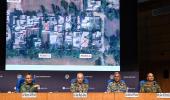'One good outcome of Operation Sindoor -- perhaps, its best outcome -- could be that India has resumed meaningful contact directly with Pakistan at the military-to-military level,' observes Ambassador M K Bhadrakumar.

As the guns fall silent and drones vanish from the sky, India and Pakistan are prioritising their way forward.
The candid, facts-based briefings by the Indian military spokespersons carried the day in New Delhi, as they asserted that Pakistan suffered grievous losses during the operations since the night of May 6/7 both in terms of the operational capabilities of groups responsible for cross-border terrorism as well as Pakistani military assets.
The message, crisp and loud, is that the Indian leadership has, true to its word, avenged the Pahalgam massacre.
It is addressed to the domestic audience highlighting that the Indian leadership has the grit to back its words with coercive and punitive action in its response to future acts of terrorism.
This cements further the centrality of Prime Minister Modi in the Indian public consciousness and will define politics.
The Opposition parties, including the Marxists weaned on dialectical materialism, have once again lost the plot and can only blame themselves for expediency. This is one thing.
However, the view from Pakistan presents a study in contrast. Much as the ruling establishment has boosted its reputation for standing up to the Indians, et al, and army chief General Asim Munir emerges as the saviour of Pakistan, the focus is on what happens next on the political and diplomatic tracks.
Specifically, this narrows down to how the Trump administration is going to fulfil its pledge of 'US assistance in starting constructive talks [with India] in order to avoid future conflicts', as conveyed by US Secretary of State Marco Rubio to General Munir on May 10.
General Munir acted upon Rubio's urge 'to find ways to de-escalate' by promptly instructing his director general of military operations to contact his Indian counterpart and propose a ceasefire, while Rubio himself followed up in real time by calling External Affairs Minister S Jaishankar to emphasise that 'both sides need to identify methods to de-escalate and re-establish direct communication to avoid miscalculation.'
Importantly, Rubio proposed to Jaishankar 'the US support in facilitating productive discussions [between India and Pakistan] to avert future disputes.'
The upshot of all this hectic activity has been Rubio's announcement on a US-Brokered Ceasefire (external link) between India and Pakistan where he revealed that India and Pakistan 'have agreed to an immediate ceasefire and to start talks on a broad set of issues at a neutral site'.
Rubio commended Modi on his 'wisdom, prudence, and statesmanship in choosing the path of peace' implying that the upcoming talks carries the imprimatur of the PM.

However, Rubio's sensational announcement has caused an uproar within India.
Although Delhi has refrained from taking exception to his claim of an India-Pakistan agreement on holding talks, media management is well under way. This is unfortunate.
Most certainly, Rubio, an Indophile who was a pillar of strength for upholding Indian interests in the India Caucus at the US Congress while a senator, acted in good faith.
And there is excellent chemistry between Jaishankar and Rubio (who is also, by the way, a 'hawk' on China.)
Why such a brouhaha in Delhi? In fact, one good outcome of Operation Sindoor -- perhaps, its best outcome -- could be that India has resumed meaningful contact directly with Pakistan at the military-to-military level.
Clearly, the media plants by Indian sources must be because of India's sensitivity about third-party mediation to ease India-Pakistan tensions.
The sources debunked President Trump's rush to claim credit for the ceasefire. Interestingly, Jaishankar himself neatly sidestepped the controversy by blandly stating that the ceasefire was possible because of an 'understanding' reached between the two militaries.
Alas, Indian sources are insinuating that Delhi gave no such commitment, as Rubio claimed, to hold talks in a neutral venue, etc.
The disclaimer stretches credulity because Rubio made the announcement only after touching base with Jaishankar.
The entire drama can only be seen as a tactical ploy to deflect the visceral attack by the Opposition, which is, of course, furious, realising belatedly that the government used it as a doormat.

In a significant development against this murky backdrop of shadow plays, a degree of rationality and sense of direction returned, as the Chinese foreign ministry announced on Saturday that National Security Advisor Ajit Doval spoke to Chinese Communist party Politburo member and China's Foreign Minister Wang Yi.
According to the Chinese readout, Doval told Wang Yi that India would be committed to a ceasefire and 'look forward to restoring regional peace as soon as possible'.
The readout contains certain profound remarks by Wang Yi at a time when Trump has appeared as the only sheriff in town.
Wang condemned the Pahalgam terrorist attack in no uncertain terms and went on to say that 'The current international situation is turbulent and intertwined. Peace and stability in the Asian region is hard-won and deserves to be cherished.'
Wang noted that 'China appreciates your [Doval's] statement that war is not India's choice, and sincerely hopes that India and Pakistan will remain calm and restrained, properly handle differences through dialogue and consultation, and avoid escalation of the situation.
'China supports and expects India and Pakistan to achieve a comprehensive and lasting ceasefire through consultations.
'This is in the fundamental interests of India and Pakistan and is also the common wish of the international community.'
This is the first known high-level exchange between China and India on the Pahalgam attack.
To be sure, China has been in close touch with Pakistan in the entire period since April 22 and China is a huge influencer in the region.

With this conversation with Wang, Doval has massively expanded the space for Indian diplomacy to work in the downstream of the fragile ceasefire -- first, to stabilise the ceasefire; second, to reinforce his direct contacts with Pakistani counterparts in recent days; and, three, to prepare the ground for talks with Pakistan at an appropriate time in an exclusively bilateral setting.
Quite obviously, India's assumption that it can do without communicating with Pakistan, a highly consequential neighbour, is no longer tenable.
In retrospect, could it be that nudging India towards talks would have been one of Pakistan's prime motivations to ratchet up tensions? There are no easy answers.
But we need to factor this in with the benefit of hindsight.
Sometimes, fantastic elements appear as a natural part of a story's environment, with the emphasis not being on the elements themselves but on what they signify or mean.
In literature, the phenomenon is known as 'magical realism' that produces a far more inclusive writing form.
Similarly, diplomacy can also enhance its realism by incorporating some magical elements that can blur the lines between speculation and reality.
Modi's impromptu visit to Nawaz Sharif's home in Lahore in December 2015 was one such attempt.
It did not have the desired effect at that point in time. But that doesn't always have to be the case.
Ambassador M K Bhadrakumar served the Indian Foreign Service for 29 years.
Feature Presentation: Aslam Hunani/Rediff.com










